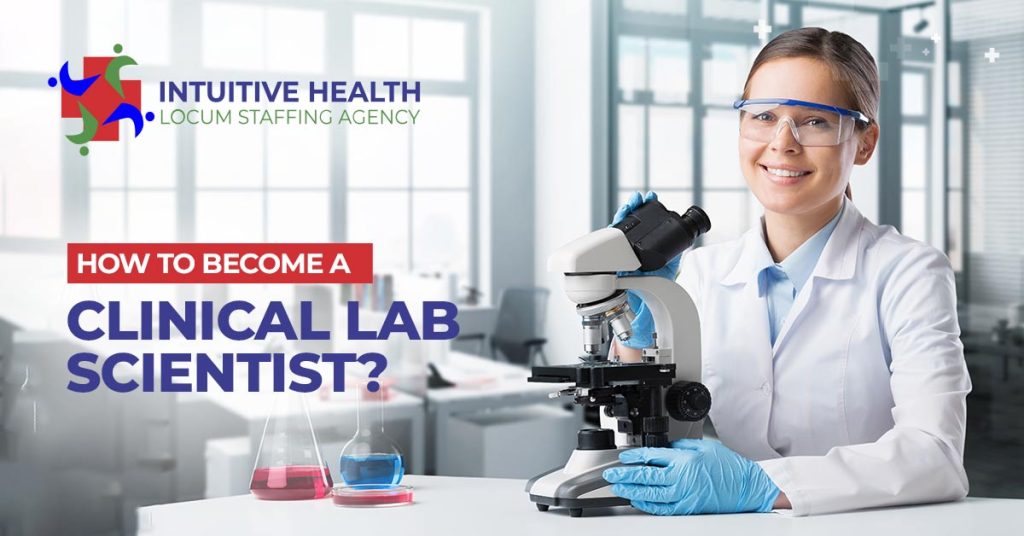Behind every medical breakthrough and accurate diagnosis lies countless hours of research and testing. Research studies delve into disease studies to understand how these diseases affect our bodies and how we can develop treatments and medicines to address them. While doctors and nurses are often in the spotlight, in healthcare, we often overlook the crucial role of professionals who conduct research and tests on diseases.

For research and for diagnostic tests, clinical lab scientists play a vital role in modern healthcare. They ensure accurate diagnosis and effective treatment through laboratory testing. Their work often goes unseen; however, their contribution is fundamental to the success of patient care and recovery. In this blog, we will explore who clinical lab scientists are, how their role is different from other laboratory professionals, their responsibilities, and the career pathway to becoming a clinical lab scientist.
Who Is a Clinical Lab Scientist?
A clinical lab scientist (CLS) is a healthcare professional trained to perform complex diagnostic tests on patient samples such as blood, urine, and tissue. These tests are critical in detecting serious diseases, such as cancer, diabetes, heart disease, and other fatal medical conditions, monitoring treatment effectiveness, and supporting preventative healthcare.
A clinical lab scientist is also commonly known as a medical technologist or medical lab scientist. They play a crucial role in helping doctors and surgeons understand patient health conditions, diagnose diseases, determine necessary treatments, and manage patient admission and discharge in the hospital. The clinical advanced training of medical laboratory scientists equips them to work with sophisticated laboratory instruments, interpret results, and ensure the accuracy of data that physicians rely on to make medical decisions.
The medical technologist runs diagnostic tests on various types of patient samples, excluding blood. When they work on blood samples, they are only provided the sample by a phlebotomists as the clinical lab scientist doesn’t take blood samples from the patients. It is actually a phlebotomist’s job to draw blood and supply the samples carefully to the laboratory.
Discover: What Does the Phlebotomist Do?
Difference Between a Clinical Lab Scientist, Clinical Lab Assistant, and Clinical Lab Technician
Just like other departments of a hospital, the laboratory is also an independent and complete department consisting of a medical laboratory team. The healthcare laboratory team consists of multiple roles, and there is often confusion regarding their responsibilities.
Clinical lab scientists are responsible for advanced diagnostic testing, analyzing the test results, troubleshooting laboratory equipment, and ensuring test procedures comply with regulatory health standards.
However, a laboratory technician works under the supervision of a medical lab scientist and performs diagnostic tests and other routine lab responsibilities. They also assist the medical technologist in analyzing the test samples. However, the clinical lab scientist has more education and experience to perform advanced lab work in healthcare.
On the other hand, a clinical lab assistant has the primary responsibility to assist the medical laboratory scientist and laboratory technician. The clinical lab assistant usually performs entry-level duties such as preparing test samples, labeling specimens, cleaning the laboratory equipment, and performing basic clerical tasks, including documentation of the test samples. They are not responsible for interpreting results or conducting complex tests, and they manage clerical laboratory work. This hierarchy ensures smooth laboratory operations, with clinical lab scientists providing the expertise needed for accurate, reliable results that guide patient care.
Responsibilities of a Clinical Lab Scientist in Healthcare
As the supervisory professional working in the clinical lab, the medical technologist holds many responsibilities in healthcare systems. In addition to performing tests and analyzing results, they have other clinical duties to fulfill as well. Below is a complete list of the day-to-day responsibilities of the clinical lab scientist:
Conducting Diagnostic Tests
The clinical lab scientist performs diagnostic tests on blood, urine, cerebrospinal fluid, and tissue samples of the patients. It helps them to detect infections, cancers, genetic conditions, and metabolic disorders in the patient.
Analyzing and Interpreting Results
After running the diagnostic tests, the medical technologist interprets complex test data. They validate the test results and ensure that the results have complete accuracy before reporting them to physicians.
Operating Advanced Laboratory Equipment
The medical lab scientist has to utilize different types of laboratory equipment to test samples and analyze the test results. Therefore, they use high-tech laboratory machines such as automated analyzers, microscopes, centrifuges, flow cytometers, and molecular diagnostic systems, autoclaves, and incubators for clinical testing procedures.
Ensure Quality Control Testing
Clinical lab scientist don’t only perform tests and monitor their results. They also have to monitor laboratory processes to maintain accuracy, precision, and compliance with safety protocols. They ensure that all laboratory systems comply with healthcare regulations.
Collaborating with Medical Teams
Other than working with a clinical laboratory technician and clinical laboratory assistant, medical technologists have to work and collaborate with other healthcare professionals as well. They also work closely with physicians, phlebotomists, pathologists, and nurses to provide essential diagnostic information for treatment planning.
Research and Development
In some cases, the clinical lab scientist contributes to medical research. Therefore, they develop new diagnostic tests or improve laboratory techniques to run tests with a better procedure. Consequently, they can draw more accurate test results for diagnosing diseases and conditions of patients.
Career Path to Become a Clinical Lab Scientist
Clinical lab scientists act as a crucial bridge between laboratory science and patient care. Their role may seem simpler, but it is essential in driving the healthcare system. However, to become a medical lab scientist, students have to complete formal education and training to pursue this career. So, the following are the steps to become a medical technologist:
Earn a Bachelor’s Degree
The minimum requirement is to get a bachelor’s degree in medical laboratory science or clinical laboratory science. Students can also take admission in a closely related discipline to laboratory sciences, such as microbiology, biochemistry, or molecular biology. The typical coursework usually includes biology, chemistry, microbiology, hematology, and immunology.
Complete a Clinical Training Program
After completing the four-year bachelor’s program, students have to earn clinical laboratory experience. Many universities and hospitals offer clinical laboratory training programs that provide hands-on experience in real laboratory settings.
Obtain Clinical Lab Scientist Certification
Certification demonstrates professional competence and is often required by employers. In the United States of America, clinical lab scientists typically obtain their official certification through the American Society for Clinical Pathology (ASCP). To get this certification, candidates must pass an exam that assesses their knowledge and skills in conducting accurate diagnostic tests in the laboratory. Some states in the USA require licensure in addition to certification. So, students must ensure that after completing the clinical laboratory training program and obtaining official accreditation, they pass their state exam to earn their clinical laboratory license.
Additionally, students who want to excel in this career can also choose to do further studies. They can pursue a masters of Science degree focusing on areas such as Molecular Diagnostics, Clinical Microbiology, Medical Genetics, Haematology, and Transfusion Science. Moreover, students can also complete a Doctor of Clinical Laboratory Science degree. These advanced studies in clinical lab research enable medical technologists to work in leadership roles in a research lab.
Where Do Clinical Lab Scientists Work?
According to the United States Bureau of Labor Statistics, the employment rate for clinical lab scientists will see a slow growth of 2% from 2024 through 2034. As medical research and lab sciences work advance with technology and healthcare needs, in the future, there will be more encouragement for young professionals to join this field. Additionally, medical lab scientists can get job opportunities in many healthcare and research settings, including:
- Hospitals
- Clinics
- Independent Diagnostic Laboratories
- Public Health Laboratories
- Pharmaceutical and Biotechnology Companies
- Academic and Research Institutions
- Forensic Laboratories
Average Salary for Clinical Lab Scientist
In hospitals and independent diagnostic laboratories, clinical lab scientists are always running and analyzing diagnostic tests. Even alone in the USA, about 7.25 billion laboratory tests are conducted annually. Given the important work these professionals do, in the USA, they earn around $61,890
The Path Forward in Laboratory Science
Clinical lab scientists are central to modern healthcare, ensuring accurate sample testing and contributing directly to patient outcomes. Their special expertise distinguishes them from other laboratory professionals, as they only perform advanced diagnostic tests and interpret results with precision. So, to become a medical technologist in the USA, students have to complete a medical laboratory science degree, followed by a laboratory training program and a certification. Thus, by following these steps, students can get multiple opportunities across hospitals, research institutions, public health organizations, and industry. Moreover, this career provides a rewarding path for those dedicated to the science behind patient care.
Do you need suggestions for finding a role as a clinical lab scientist? Then contact Intuitive Health Services, which provides health staffing services for all medical professions according to the candidate’s preferences..

